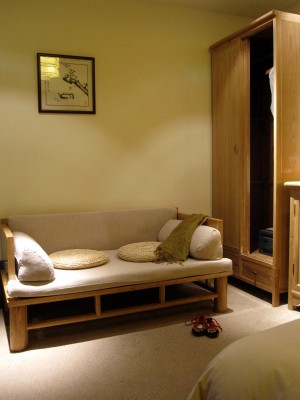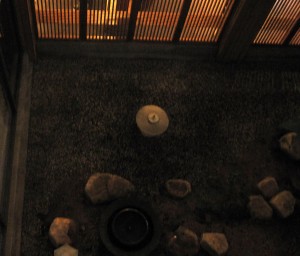
Xiangji Yard Boutique Hotel
Booking a hotel room online can be a stressful experience particularly when you only have one week ’til lift off. I knew there was a chance that I might be disappointed by my hasty selection, but really I had given up on expectations the closer I came to departure.

Several hotels were candidates for my short stay in Hangzhou, the capital city of China’s prosperous Zhejiang province. On the short list was a boutique hotel which was new (generally a good thing in China), seemed to have a Zen-like and peaceful decor, was affordable and appeared to be in a decent part of town. That was all I knew when I arrived in the city. It was clear however, when I walked through the large main doors of Xiangji Yard Boutique Hotel 香积, that I had stumbled upon something quite extraordinary.
The building was 6 months old in August, 2012, but it had an ancient charm. Built as a quasi-reproduction of a traditional inn, there are 28 rooms on only 2 floors with no elevator. It is named for Xiangji Temple located a few feet away. Each guest room has a tea station with fresh whole leaf tea (Hangzhou is the centre of Longjing /Dragonwell tea after all), tasting cups, gaiwan and kettle. It’s located one block from the historic Bejing – Suzhou Grand Canal – over 2000 years old and restored with picturesque walkways and pagodas in the area near the hotel. More on that in another post.

There were tea rooms located in areas throughout the hotel, in courtyards on the main floor and several on the second floor where I was staying. One was right next door to my room. The shelves were stocked with porcelain jars of tea. I’m not able to read Chinese, but when I looked inside the jars I was able to identify each of the dozen or so teas – Tie Guan Yin, Longjing, Keemun, Jasmine green, Mao Jian, Anji Bai Cha etc. – the usual favourites. I’m sure if I had asked at the front desk they would have provided me with a tea girl to prepare a lovely cup for me, but I was usually “tea-ed out” by the time I returned to the hotel.


My room was beautifully appointed with muted natural hues, ceramic sinks, a stone bath tub and white linen. It was a calm place of solitude to reflect on the events of the day and organize myself for tomorrow’s excursions.


Throughout the hotel there are courtyards – some open to the air and catching rain in small ponds as it falls.



Was it completely and utterly as calm and beautiful as it looks? Well… the first night I slept with my head under the sheets because the room had a moldy smell. I asked to be moved and they accommodated me when I returned from my day’s activities. The new room is the one you see in the pics – larger with similar arrangement and no odour. A fruit platter was brought to my room that evening – classy. The front desk had no English. I’m not one of those tourists who gets huffy when there are no English speakers on staff because I can usually get my point across, but I was happy that the manager had some English. The stone tub was beautiful but took a long time to warm up. Much like a heavy teapot, the heat from the hot water went straight into the thick stone. But these are mere specks in an otherwise impeccable experience.
As I was packing to leave, I wished that I had planned to stay longer in Hangzhou. Several weeks would have been a generous amount of time to visit more outlying tea gardens and explore this prosperous city and the many treasures that the historic district might reveal.
See tripadvisor for details




